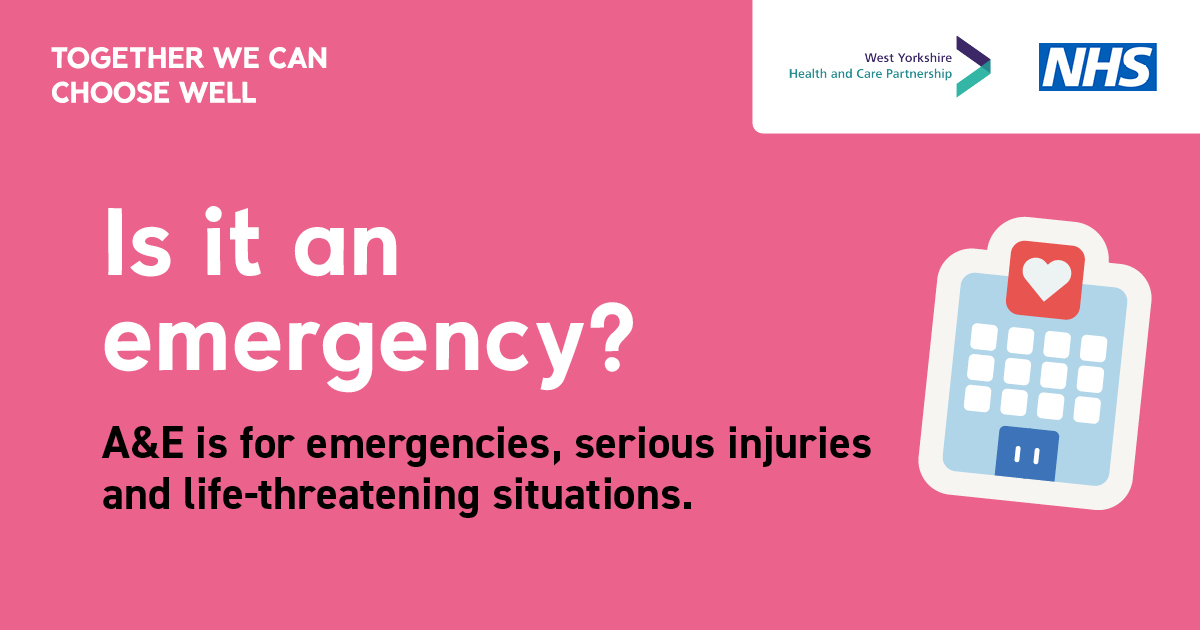Posted on: 15 May 2024
The NHS in West Yorkshire is urging people to choose wisely for their healthcare needs as health services are currently extremely busy.
 Accident and emergency departments (also known as A&E) across the region are experiencing extremely high levels of patient need, well above the seasonal average.
Accident and emergency departments (also known as A&E) across the region are experiencing extremely high levels of patient need, well above the seasonal average.
People attending A&E with injuries or conditions that aren’t serious or life threatening may have to wait a very long time to be seen, so it’s important that you are prepared and know how to get help if needed during this time.
Dr James Thomas, Medical Director for the NHS West Yorkshire Integrated Care Board, said: “Health and care services are here to help. During times of significant pressure on local services, we still encourage the public to come forward and not to delay if they need help or are concerned about their health. However, we want to make sure they’re using the right services and they know when to go to a pharmacy, use NHS 111 or their GP practice rather than emergency services.”
“There are steps we can all take to make sure we use the most appropriate service for our needs to support our busy health services. If you do become unwell visit togetherwe-can.com for advice or 111.nhs.uk”
Over these busy periods, people are asked to think ahead and to choose the right service for their healthcare needs. Together we can make a real difference and there are things we can all do:
- Save time by seeking medical advice and booking appointments online via the NHS App or your GP practice website
- Use 111.nhs.uk if it’s not an emergency and you need health advice quickly. The expert team will be able to help you get the care you need. If you don’t have internet access, you can also call 111
- You should only call 999 for an ambulance in an emergency, when it is life-threatening or very serious – for example, signs of a heart attack or stroke, severe breathing difficulties, severe injuries or heavy bleeding. For more information, please visit the NHS website
- It is a good idea to have a small stock of basic medicines at home for minor illness or injury. These may include paracetamol, plasters, indigestion remedy and anti-diarrhoeal medicine. See the NHS website for advice on what you should keep in your first aid kit, or ask your local pharmacist for advice
- Visit your local community pharmacy for medical advice and treatments for things like colds, tummy troubles, rashes, and pains, as well as common conditions like insect bites, urine infections, sore throats and ear ache. Search ‘Find a pharmacy NHS’ to find an open pharmacy near you Find a pharmacy - NHS (www.nhs.uk)
- If you need medication when your own GP or pharmacy is closed, there’s information about how you can get medicines out of hours on the NHS website
- Many GP practices offer extended opening hours during evening and weekends. If you think you need to see your GP team, contact them as you usually would
- Find self-care tips and local services’ information at togetherwe-can.com. Visit wyhealthiertogether.nhs.uk for trustworthy healthcare advice for parents and carers
- Don’t wait until you are in mental health crisis. There’s a wide range of support and resources available for everyone, including a 24/7 free phone line. Visit togetherwe-can.com/mental-health
- It’s very important that people who need medical care come forward, especially when someone has a life-threatening illness or injury. A range of services are available to ensure accident and emergency Departments (A&E) are freed up to treat those with life-threatening and critical illnesses or injuries. Care for life-threatening or serious illness/injury will be prioritised
- Please look out for your neighbours who may live alone or be lonely.

